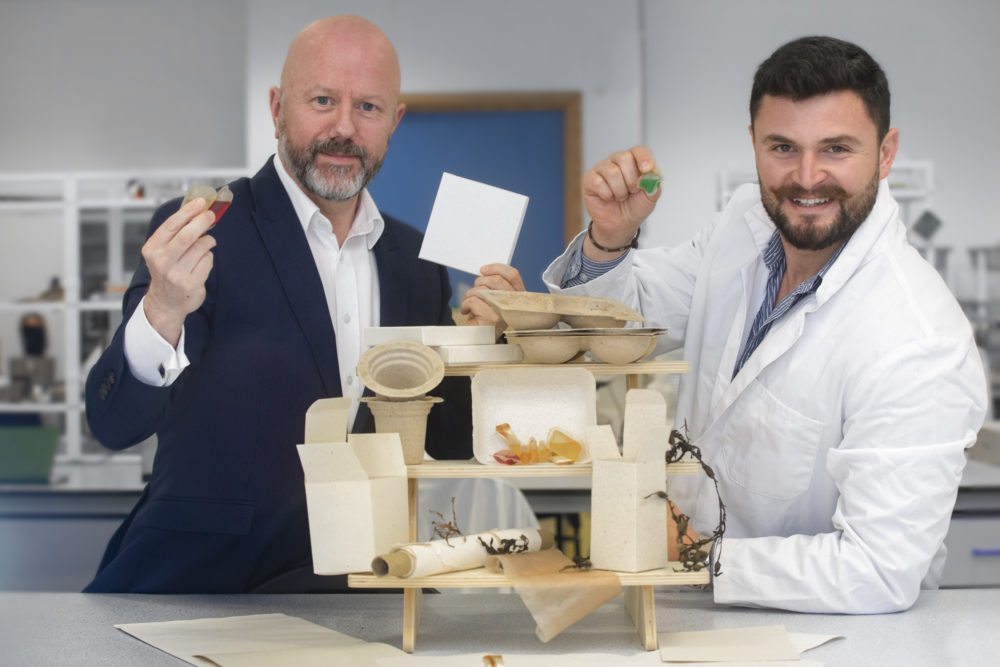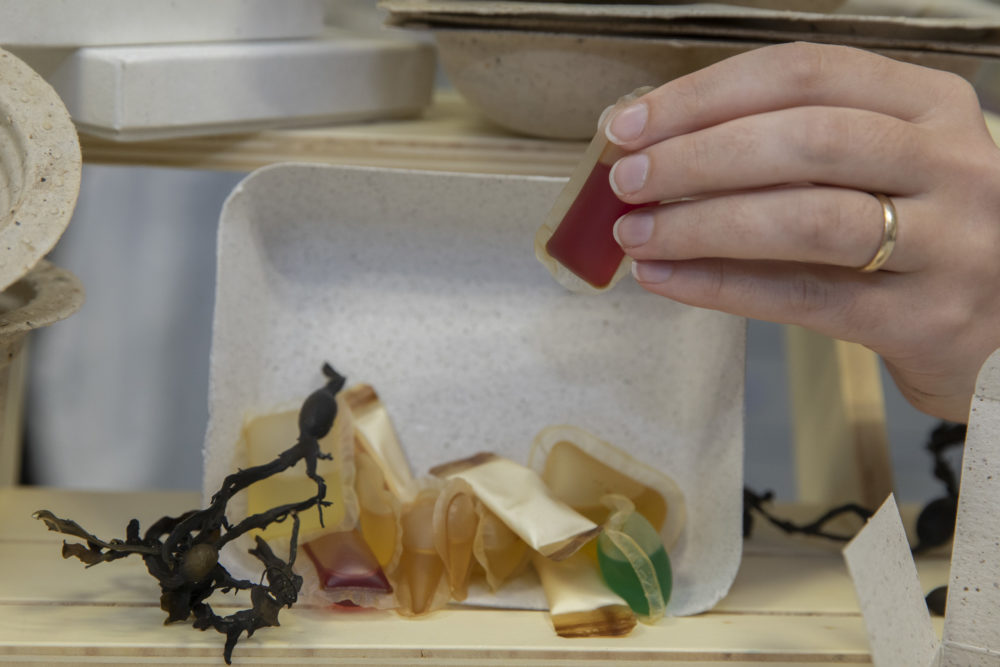A pioneering start-up company aims to beat the scourge of plastic pollution of the oceans with its groundbreaking range of packaging made from seaweed.
PlantSea is based at Optic Technology Centre in St Asaph and was founded in 2020 by three friends at Aberystwyth University who discovered that seaweed washed up on the beaches of West Wales could be turned into a range of biodegradable materials.
A growing seaweed harvesting industry in the UK and beyond also ensures its potential growth as a cash crop to be turned into products from eco-friendly, biodegradable materials to replace single-use plastic.
Seaweed can also be used instead of paper and card to make stationery, boxes, and bags, as well as water-soluble film and agricultural mulch film, along with packaging for cosmetics, hair care products, and washing machine capsules.
PlantSea attracted the attention of Ashley Rogers, Chief Executive of the North Wales Business Council which runs the Net Zero North Wales Network when they had a stand at a network event at Venue Cymru in Llandudno.
The next meeting of the network, which was set up to help businesses in the region chart a path to a carbon-free future, takes place at Pontio, Bangor, on Wednesday, October 2, at 12.30pm.

Dr Gianmarco Sanfratello, along with co-founders Dr Rhiannon Rees, PlantSea’s Chief Executive Officer, and Dr Alex Newnes, Chief Operation Officer, won a competition organised by Aberystwyth University” with their idea to make green products from seaweed.
After winning the £10,000 award for best business idea they established the company and applied for further funding from the Welsh Government and Innovate UK to set up a laboratory and team.
Gianmarco, the Chief Technical Officer, originally from Sicily, said: “Since the start, our idea was to make packaging from seaweed, initially collected from the shore and then processed it – we used to do that in a kitchen – to make our products.
“After much trial and error, we learned that this naturally abundant marine resource could make valuable plastic alternatives to biodegradable sachets used for laundry detergents and shampoos.”
“Perfect alternative”
He added: “Globally, huge numbers of these products come in plastic packaging, which then ends up in the water and ultimately in the sea.
“We were very aware of plastic pollution, its consequences on the planet and how difficult it is to prevent.
“With that in mind, our seaweed water soluble film is a perfect alternative for PVA/PVOH, which is a synthetic polymer that’s generally used to make laundry pods.
“It’s under scrutiny in several countries, like the USA, as it leaves microplastics behind, which further enter our drinking water while research shows that microplastics have also made their way into breast milk.”
“We have been working on creating a suitable material and have had support from like-minded organisations, the Welsh Government, and Innovate UK, a UKRI Government body, as well as by the BioComposite Centre at Bangor University while we are based here at Optic Centre in St Asaph, also operated by Wrexham University.
“While our water-soluble technology is still under development, the seaweed paper is already available in the market.
“The seaweed residue left after making the film is used for making our seaweed paper and it can be bought online and through direct inquiry on our website.
“The paper can be used to make further packaging like boxes and bags. Our aim is to give consumers a choice, improve our customers’ carbon footprint and ultimately together contributing to our planet sustainability.
“There is a growing seaweed farming industry in the UK, particularly in Scotland where it has been going for about 10 years, and there are plans to develop farms in Wales. In Norway and other parts of the world, they have been harvesting seaweed for twice as long, and there is a larger capacity.
“We would love to grow our business further here in North Wales, developing a technology that could then be exported and used across the world – a sustainable and affordable platform technology that can contribute to replace plastics providing ecofriendly and competitive alternatives.
“We have developed a unique process to convert raw seaweed into usable materials in a rigid form and in a flexible water-soluble film specifically for packaging individual doses.
“Microplastic is one of the major issues we face as consumers, and we believe we have developed a product here in North Wales that could turn the tide on plastic pollution.”

Plastic packaging for cosmetics, shampoos, and detergents as well as a host of other products are among the leading polluters of the world’s seas, rivers, and landfill sites.
In the UK over 70,000 tons of plastic is used for personal care packaging and over 500 million shampoo bottles go to landfill annually, and it is big business – the value of personal care products in the UK alone is £1 billion.
Worldwide it is estimated that between eight and 10 million metric tons of plastics enter the oceans every year. Currently, there are around 75 trillion pieces of plastic in the seas which will outweigh all the fish by 2050 and take up to 1,000 years to degrade.
Solution
Ashley Rogers said: “Plastic pollution is one of the major environmental challenges we face, so it’s really refreshing to see a North Wales business looking to grow while helping solve that problem.
“It’s ironic that we are looking for a solution to the pollution of the seas and this solution is found in the sea in the form of seaweed.
“PlantSea have started by addressing the problem of plastic pollution and in the process of starting up the business they’ve taken it from the cradle to the grave, from where do we source a supply of low carbon material through to how the end product is disposed of. The full product lifecycle.
“Clearly, they’ve looked at where the largest potential markets are and identified cosmetics packaging and washing machine tablets but also looked at how the byproducts of the manufacturing process can be used. Some really lateral thinking here on new product development in a Net Zero world.
“It’s also a fantastic example of partnership working involving Bangor and Wrexham Universities as well as the Welsh Government and Innovate UK.”
The next Net Zero North Wales Network event takes place at Pontio in Bangor on Wednesday 2 October. Find out more here.
Support our Nation today
For the price of a cup of coffee a month you can help us create an
independent, not-for-profit, national news service for the people of Wales, by
the people of Wales.

